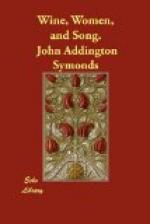“Bacchus saepe visitans
Mulierum genus
Facit eas subditas
Tibi, O tu Venus!”
From his temple, the tavern, water-drinkers and fastidious persons are peremptorily warned:[27]—
“Qui potare non potestis,
Ite procul ab his festis;
Non est hic locus modestis:
Devitantur plus quam pestis.”
The tavern is loved better than the church, and a bowl of wine than the sacramental chalice:[28]—
“Magis quam ecclesiam
Diligo tabernam.”
“Mihi sapit dulcius
Vinum de taberna,
Quam quod aqua miscuit
Praesulis pincerna.”
As in the love-songs, so in these drinking-songs we find no lack of mythological allusions. Nor are the grammatical quibbles, which might also have been indicated as a defect of the erotic poetry, conspicuous by absence. But both alike are impotent to break the spell of evident sincerity. We discount them as belonging to the euphuism of a certain epoch, and are rather surprised than otherwise that they should not be more apparent. The real and serious defect of Goliardic literature is not affectation, but something very different, which I shall try to indicate in the last Section of this treatise. Venus and Helen, Liber and Lyaeus, are but the current coin of poetic diction common to the whole student class. These Olympian deities merge without a note of discord into the dim background of a medieval pothouse or the sylvan shades of some ephemeral amour, leaving the realism of natural appetite in either case untouched.
It is by no means the thin and conventional sprinkling of classical erudition which makes these poems of the Goliardi pagan, and reminds the student of Renaissance art. Conversely, the scholastic plays on words which they contain do not stamp them out as medieval. Both of these qualities are rococo and superficial rather than essential and distinctive in their style. After making due allowances for either element of oddity, a true connoisseur will gratefully appreciate the spontaneous note of enjoyment, the disengagement from ties and duties imposed by temporal respectability, the frank animalism, which connects these vivid hymns to Bacchus and Venus with past Aristophanes and future Rabelais. They celebrate the eternal presence of mirth-making powers in hearts of men, apart from time and place and varying dogmas which do not concern deities of Nature.
FOOTNOTES:
[Footnote 24: Carm. Bur., p. 133.]
[Footnote 25: Ibid., p. 251.]
[Footnote 26: Carm. Bur., p. 238.]
[Footnote 27: Ibid., p. 240.]
[Footnote 28: Wright’s Walter Mapes, p. xlv.; Carm. Bur., p. 69.]




